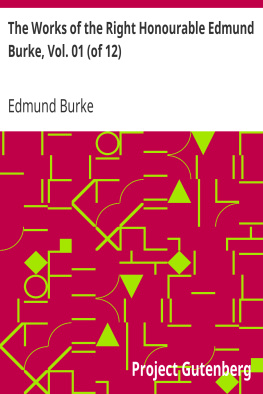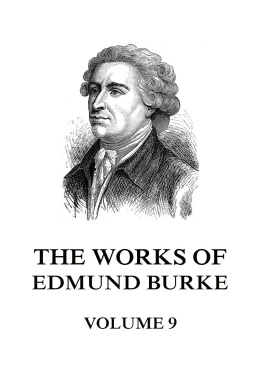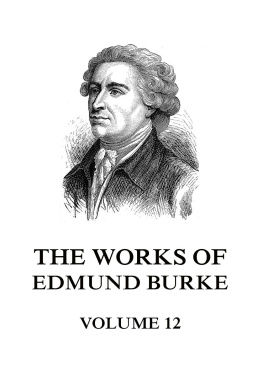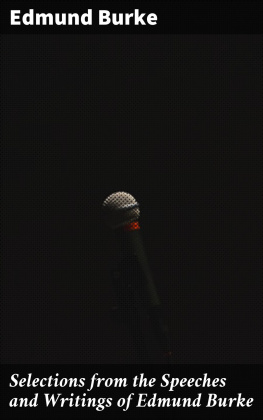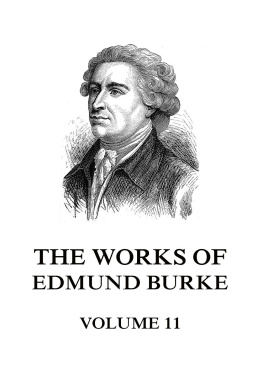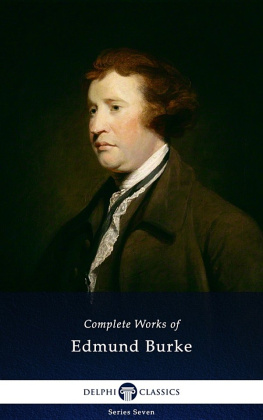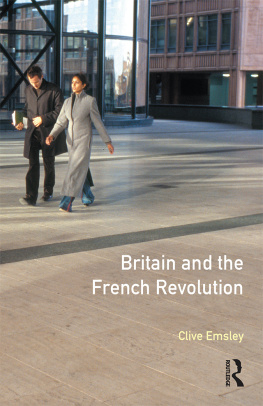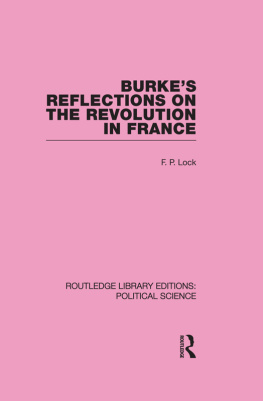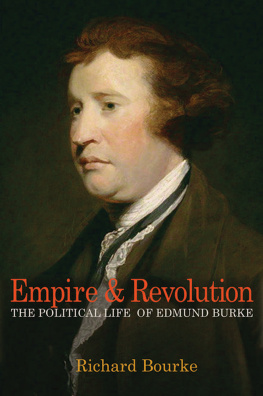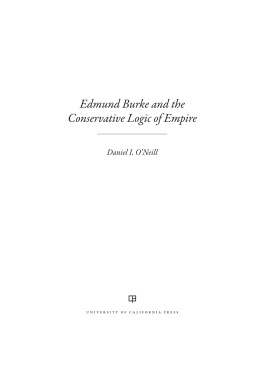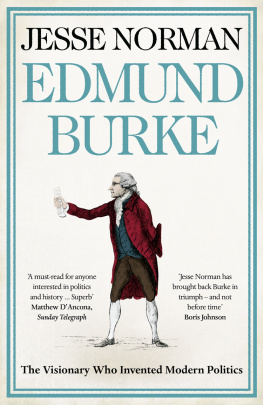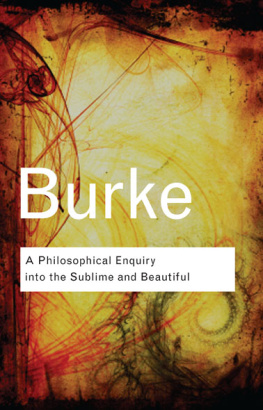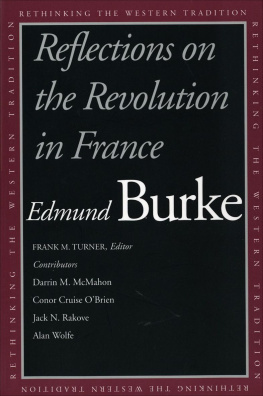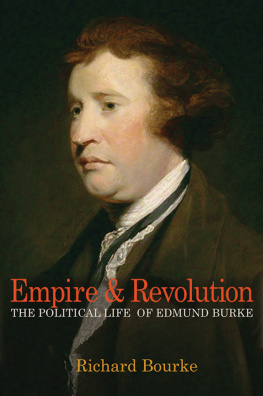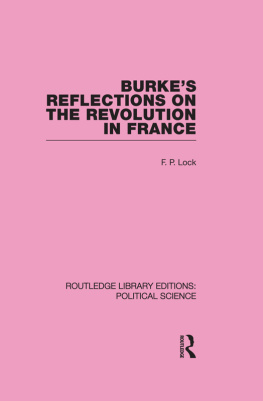EDMUND BURKE (172997) was born in Dublin and educated at Trinity College, Dublin. In 1750 he entered the Middle Temple in London but soon left the law for literature. His first publication, A Vindication of Natural Society (1756), was followed in 1757 by A Philosophical Enquiry into the Sublime and the Beautiful, a text that was to influence the writers of the Romantic period. He became private secretary to Single Speech Hamilton, then Secretary for Ireland, until in 1765 he filled the same post for the Marquis of Rockingham, then Prime Minister. He was elected MP for Wendover and his oratory gained him influence in the Whig party, although he was not to hold office until the downfall of the Tory party, under Lord North, in 1783. His championship of the then unpopular causes of Catholic emancipation and the relaxation of the Irish Trade Laws cost him his seat at Bristol and he was subsequently elected MP for Malton in 1781. Burke became paymaster of the forces in 1782, resigned with Fox, and returned to the same office under the coalition government in 1783. A great part of his political career became dedicated to the problem of India and he took part in the investigation of the East India Company affair. The French Revolution, too, prompted one of his best-known works, Reflections on the Revolution in France (1790). He retired in 1794 and received a pension from the ministry.
CONOR CRUISE OBRIEN is Emeritus Professor of the University of Dublin. Born in 1917, he gained his BA and Ph.D. degrees from Trinity College, Dublin, and entered the Department of External Affairs of Ireland in 1944. In 1955 he was Counsellor in Paris, and from 1956 until 1960 he was head of the United Nations section and a member of the Irish Delegation to the UN. In 1961 he represented the Secretary-General of the UN in Katanga, and at the end of that year he resigned from his appointments. He was Vice-Chancellor of the University of Ghana from 1962 to 1965, Albert Schweitzer Professor of Humanities at New York University from 1965 to 1969, a Fellow of St Catherines College, Oxford, from 1978 to 1981 and Visiting Professor at Dartmouth College, USA, from 1984 to 1985. He was a member of the Dail for Dublin North-East from 1969 until 1977 and of the Senate of the Republic of Ireland for the following two years. He joined the Observer in 1978, where he was Editor-in-Chief until 1981. His books include Parnell and His Party (1957), To Katanga and Back (1962), Writers and Politics (1965), The United Nations Sacred Drama (with drawings by Feliks Topolski; 1968), States of Ireland (1972), Herod (1978), Neighbours: The EwartBiggs Memorial Lectures 19789 (1980), The Siege: The Story of Israel and Zionism (1986), The Great Melody: A Thematic Biography of Edmund Burke (1992), Ancestral Voices: Religion and Nationalism in Ireland (1994), On the Eve of the Millennium (1996) and The Long Affair: Thomas Jefferson and the French Revolution (1996).
Reflections on the Revolution in France
AND ON THE PROCEEDINGS
IN CERTAIN SOCIETIES IN
LONDON RELATIVE TO THAT EVENT
Edited with an Introduction and Notes by
CONOR CRUISE OBRIEN
PENGUIN BOOKS
PENGUIN BOOKS
Published by the Penguin Group
Penguin Books Ltd, 80 Strand, London WC2R 0RL, England
Penguin Group (USA) Inc., 375 Hudson Street, New York, New York 10014, USA
Penguin Books Australia Ltd, 250 Camberwell Road, Camberwell, Victoria 3124, Australia
Penguin Books Canada Ltd, 10 Alcorn Avenue, Toronto, Ontario, Canada M4V 3B2
Penguin Books India (P) Ltd, 11 Community Centre, Panchsheel Park, New Delhi 110 017, India
Penguin Books (NZ) Ltd, Cnr Rosedale and Airborne Roads, Albany, Auckland, New Zealand
Penguin Books (South Africa) (Pty) Ltd, 24 Sturdee Avenue, Rosebank 2196, South Africa
Penguin Books Ltd, Registered Offices: 80 Strand, London WC2R 0RL, England
www.penguin.com
First published 1790
Published in Pelican Books 1968
Reprinted in Penguin English Library 1982
Reprinted in Penguin Classics 1986
Reissued with updated Introduction and Bibliographical Note
and new Curriculum Vitae of Edmund Burke 2004
Introduction and notes copyright Penguin Books Ltd, 1968, 2004
All rights reserved
Except in the United States of America, this book is sold subject
to the condition that it shall not, by way of trade or otherwise, be lent,
re-sold, hired out, or otherwise circulated without the publishers
prior consent in any form of binding or cover other than that in
which it is published and without a similar condition including this
condition being imposed on the subsequent purchaser
EISBN: 9780141907888
CONTENTS
ACKNOWLEDGEMENTS
I AM indebted to Professor Thomas Copeland, the general editor of The Correspondence of Edmund Burke (see ); to Earl Fitzwilliam for permission to use the Burke papers in the Fitzwilliam Wentworth Collection; to Mr John Babbington, Chief Librarian, and Miss R. Meredith, Librarian, Central Public Library, Sheffield, for facilitating access to these papers. Finally and especially, my thanks are due to my wife for her invaluable work on the annotation. The notes as they stand are our joint work. Professor Todd in presenting his definitive edition of the text of the Reflections spoke of peculiarities condoned by the author, which of course have been preserved in the text. If any additional peculiarities have been condoned by the editor he alone is responsible for these.
C.C.OB.
The footnotes to this text are indicated by asterisks, daggers, etc.
The superior numbers (thus: 48) refer to the notes by the editor of this Pelican edition. They are to be found on p. 378ff.
INTRODUCTION
THE MANIFESTO OF A COUNTER-REVOLUTION
1
THE spectre haunting Europe in The Communist Manifesto (1848), and haunting the world today [1968], walks for the first time in the pages of Burke:
out of the tomb of the murdered monarchy in France has arisen a vast, tremendous, unformed spectre, in a far more terrifick guise than any which ever yet have overpowered the imagination, and subdued the fortitude of man. Going straight forward to its end, unappalled by peril, unchecked by remorse, despising all common maxims and all common means, that hideous phantom overpowered those who could not believe it was possible she could at all exist, except on the principles, which habit rather than nature had persuaded them were necessary to their own particular welfare, and to their own ordinary modes of action.
The revolution which Burke feared is not of course identical with Marxs Communist revolution, but has much essential in common with it, and in some ways more in common with it than with the actual French and elsewhere, some of the best examples of that aristocratic critique of the bourgeoisie, to which the Communist Manifesto allows a provisional and sardonic welcome. Burke and Marx both sought to understand the revolutionary principles at work in France Burke in order to stop them from spreading, and to destroy the nucleus of infection; Marx in order to hasten the victory of a new revolution, bringing with it the triumph of all that for Burke had been most hateful though not of that which had been most contemptible in the old one.
The great revolutions of our own time, those of Russia and China, came, under Marxist leadership, in lands which had never known an equivalent of the French Revolution. France, itself, and those other Western countries most exposed to the Enlightenment, and like Britain and the United States least resistant to those principles of political democracy which Burke abhorred, are not among the most revolutionary in the world today. The country which was the fulcrum of counter-revolution in his day the country whose Empress he praisedI shall return to this topic, in considering the relevance of Burke to the militant anti-communism of our own day. First, however since Burkes own attitude to the Revolution was not all at once a crusading one it is necessary to discuss the actual development of his opinions, emotions and apprehensions about the Revolution, to the extent to which these are revealed in his surviving writings.


